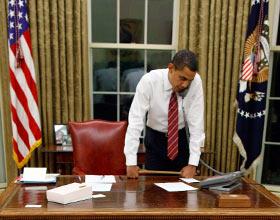|

Objectively speaking, this was another disastrous week for Barack Obama’s foreign policy: the fall of the cities of Ramadi and Palmyra to the Islamic State in Iraq and the Levant (Isil) exposed once again the limits of the administration’s strategy of relying on moderate local forces to roll back the extremists.
In such circumstances you might reasonably have expected to see Mr Obama and his officials rush to man the pumps, if only to beat back the fires of criticism at home, but here’s the funny thing: there really wasn’t that much criticism.
The usual suspects on the Republican Right - like Senator John McCain and his wingman Senator Lindsey Graham – issued warnings about the dangers of creating a power vacuum in the Middle East, but collectively speaking, America largely just shrugged.
At the State Department a spokesman acknowledged there had been a “setback”, but pointed to the net gains of the coalition policy in Iraq since last summer – at least Baghdad wasn’t under threat, he said, searching desperately for the positives.
At the White House anonymous officials briefed reporters that the president was “mulling” more sending weapons and providing training for the moderates, but that piece of non-news made barely a ripple since Mr Obama’s “mulling” of these things has never led to much in the past.
Mr Obama himself was blunter still. The Middle East was at an “inflection point”, he conceded in a long interview with The Atlantic, but these were ultimately their problems, not ours. “If they are not willing to fight for the security of their country,” he said of Iraq, “we cannot do that for them.”
The silence was deafening. The 2016 general election is being billed in some quarters of Washington as a “foreign policy” election, but the American public’s collective indifference to events in the Middle East – notwithstanding 250,000 dead Syrians and 4 million refugees – suggests otherwise. A Gallup poll this month ranked foreign policy sixth among the American electorate's concerns behind the economy, Washington dysfunction, healthcare, terrorism and income inequality. Of course, terrorism is the kicker there – if there is another a spectacular September 11 style terror event with origins in the Middle East that changes everything – but until then, the American public seems broadly content to let the fires burn. In this regard, Mr Obama’s foreign policy has been depressingly adroit. In the US public mind, the threats feel distant; the refugees and the returning jihadists swarm at the gates of Europe, not the US homeland, and all the while the oil continues to flow – both from the Middle East, and also now from the shale beds of Texas and North Dakota. And as Mr Obama added in that Atlantic interview, polls show that for most Americans, the biggest lesson to be learned from George W Bush’s invasion of Iraq was not go back in: no more boots on the ground, let the Middle East spill its own blood. So while the foreign policy elite frets and criticises, the ordinary public largely gives Mr Obama a free pass. Even last year’s beheading of American nationals in their faux-Gitmo orange jump suits only briefly moved the needle, but after a flicker of public outrage, it settled again. All this leaves Republicans in a difficult position. In the early primary hustings, pretty much all the candidates are united in bashing Mr Obama for being weak and indecisive, while demanding a more muscular foreign policy that befits their instinctive notion of America as the indispensable superpower. “I’m running because I think the world is falling apart,” said Lindsey Graham as he all-but-announced his candidacy this week, but when it comes to arguing that more Americans must die in the Middle East to protect the homeland, he is a lone voice. Notwithstanding the limits of Mr Obama’s foreign policy, that kind of interventionism now sits on the fringes of the party of George W. Bush, with most candidates – including, after a fashion, his younger brother, Jeb – now saying that the invasion of Iraq was a huge mistake. The public agrees with them. Among the elites, there is demand for a debate over what America’s place in the world should be. “Lost”, is the verdict on the cover of this week’s Time magazine, with polls showing a new generational divide now splitting America on foreign policy. Nearly two-thirds of over-60s still think of America as “exceptional”, according to research by Ian Bremmer of the Eurasia Group, compared to less than half of under-30s – but it is an indication of the direction of travel that 40 per cent of 18-29s say America should “mind its own business”. And there lies the rub. America, particularly younger, urban liberal America, does not really want to know: petrol prices are low, the economy is on the up and while Republicans huff and puff about Mr Obama’s ineffectualness, a candidate who promises real re-engagement has a shrinking constituency. Mr Obama has often been criticised for his glib foreign policy motto “don’t do stupid s***”, but the US public agrees with him. “Anything for a quiet life,” is the new motto, particularly among the young. Only time will tell whether Abu Bakr al-Baghdadi and the black-flag waving cohorts of Isil intend to let it stay that way.
| 


